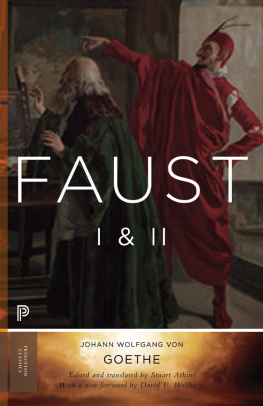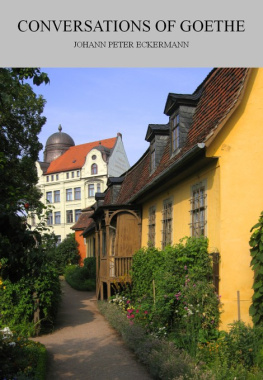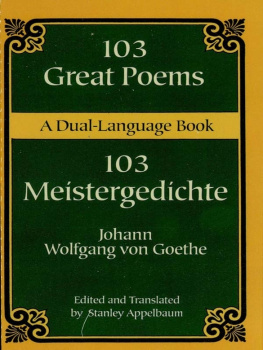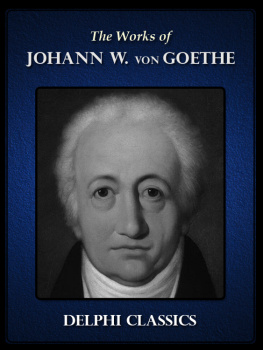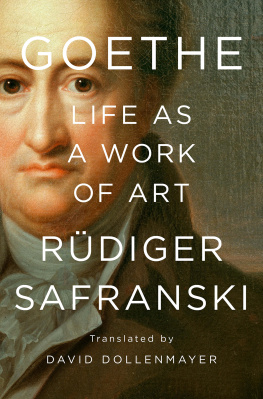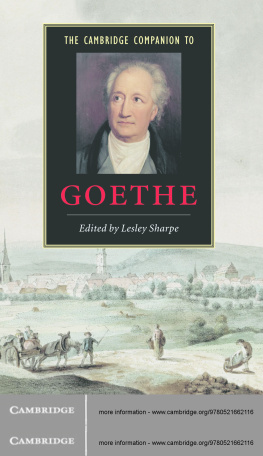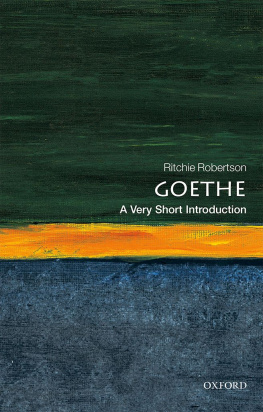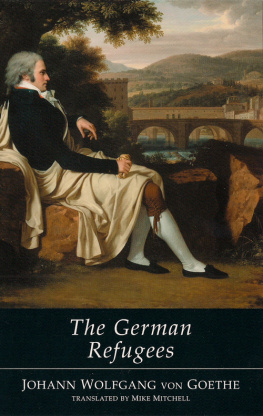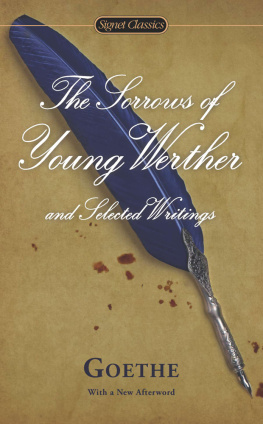Johann Wolfgang von Goethe - The Sufferings of Young Werther: A New Translation
Here you can read online Johann Wolfgang von Goethe - The Sufferings of Young Werther: A New Translation full text of the book (entire story) in english for free. Download pdf and epub, get meaning, cover and reviews about this ebook. year: 2012, publisher: W. W. Norton & Company, genre: Art. Description of the work, (preface) as well as reviews are available. Best literature library LitArk.com created for fans of good reading and offers a wide selection of genres:
Romance novel
Science fiction
Adventure
Detective
Science
History
Home and family
Prose
Art
Politics
Computer
Non-fiction
Religion
Business
Children
Humor
Choose a favorite category and find really read worthwhile books. Enjoy immersion in the world of imagination, feel the emotions of the characters or learn something new for yourself, make an fascinating discovery.
- Book:The Sufferings of Young Werther: A New Translation
- Author:
- Publisher:W. W. Norton & Company
- Genre:
- Year:2012
- Rating:4 / 5
- Favourites:Add to favourites
- Your mark:
- 80
- 1
- 2
- 3
- 4
- 5
The Sufferings of Young Werther: A New Translation: summary, description and annotation
We offer to read an annotation, description, summary or preface (depends on what the author of the book "The Sufferings of Young Werther: A New Translation" wrote himself). If you haven't found the necessary information about the book — write in the comments, we will try to find it.
Johann Wolfgang von Goethe: author's other books
Who wrote The Sufferings of Young Werther: A New Translation? Find out the surname, the name of the author of the book and a list of all author's works by series.
The Sufferings of Young Werther: A New Translation — read online for free the complete book (whole text) full work
Below is the text of the book, divided by pages. System saving the place of the last page read, allows you to conveniently read the book "The Sufferings of Young Werther: A New Translation" online for free, without having to search again every time where you left off. Put a bookmark, and you can go to the page where you finished reading at any time.
Font size:
Interval:
Bookmark:
J OHANN W OLFGANG VON G OETHE

The Sufferings of Young Werther
A New Translation by Stanley Corngold

W. W. NORTON & COMPANY
NEW YORK | LONDON
 CONTENTS
CONTENTS 
The Sufferings of Young Werther
TRANSLATOR'S
INTRODUCTION
Y OUNG G OETHE wrote The Sufferings of Young Werther in four weeks in spring 1774 , a hot outpouring of genius; the book was swiftly printed and sold at the Leipzig fair that fall. If it was thrilling for this twenty-five-year-old footloose lawyer and dilettante to know that his novel was being bought, pirated, read, translated, and imitated throughout Europe, it was to become a burden as he matured into Privy Councillor Johann Wolfgang von Goethe diplomat, scientist, literary giant, and maker of prudent maxims; forever after, Goethe was to be known as the author of Young Werther and identified with his suicidal hero. Goethe saw this danger early and furnished a second edition in 1775 with a poem that ends in italic, Be a man, and do not follow me [to my doom]. The danger was real, as Goethe himself acknowledged: Werther is a creation... that I, like the pelican, fed with the blood of my own heart.... I am uneasy when I look at it and dread the return of the pathological condition from which it sprang. At the end of his life, he spoke ruefully of the novels fire rockets that continued to flare up in and around him for half a century.
Werther is himselfthis self-absorbed, provincial youth in a German novel. At the same time he anticipates a recurring type: the late-adolescent, elite-educated, hormone-besotted, rebellious youth with artistic inclinations who would rather be in loveand who then promptly falls in love with the wrong woman. But Werther would not seize our imagination now were it not for his gift, as Goethe wrote, for profound and pure feeling and true penetration. And once created and given voice, what a gifted presenter of himself this Werther is! As readers, we wrestle with the paradox of how someoneWerthercan claim to be so lost, so disconsolate, so barren of speech and feeling and yet find his way to the words that make his struggle unforgettable. At the end, of course, Goethe needs to have the Editor step in for Werther, to give an account of a disintegrating character in a different sort of languagea pedantic, official-sounding, propriety-upholding languageimplying that Werther was no longer able to speak for himself. But even here, when Werthers letters and notebooks are quoted, his words remain vivid and gripping even as he laments.
For much of the novel, Werther cannot find his way; his thoughts, his longings, his talents exceed anything he thinks the world can offer him as a worthwhile object of pursuit, and at times we may be inclined to agree. True, that worthy object might be his beloved Lotte, but she is by definition unavailable; she is engaged to another, a deserving man. For the rest, work in government, at the ambassadors office, is a plague, dry as dust and continually checked and interfered with by that dreaded figure, ones superior. Entry into aristocratic society is soon enough proved fruitlessand humiliatingwhen Werther, a bourgeois, thoughtlessly wanders into it. There is artin the beginning Werther seems to be a capable draughtsmanbut soon his talents fail him; in this case, the object of his art, Nature, is an object not too small but too big; he is prone to be overwhelmed by landscapeby hills and peaks and floods. And here, where Nature has ceased to be the object of the painters masterful art, it can become a demon too, offering, in its domination of the individual mind, a tempting alternative to consciousness: un consciousness, ecstasy, self-loss. Franz Kafka, whose work is shot through with reminiscences of Werther and who admitted his dependence on Goethewrote of the life-task: not to shunt off the ego but consume it, which defines the artists task especially: to seize all the egos energies, longings, hurts, passions and burn them as fuel for the higher projectthe work of art. This is Goethes view and Goethes task but not one that Werther can perform; the declared object of his art is Nature, and Nature is too chaotic, a provocation to shake off the self in deaththe bigger ecstasy. And this is what, in the end, Goethe deplores and writes his Werther to steel himself againstthe dreadful vision, as in Werthers great letter of August , 1771 , of the spectacle of infinite life transformed before my eyes into the abyss of an ever open grave.
The text that follows is a translation, an effortful attempt to capture the always astonishing liveliness of Goethes language. Like the best wines of those years, it still keeps its fruit, its freshnessit breathes, it lives. For if Werther is an event for Goethe the writer, a breakthrough into a career as a literary hero, it is much more: it is a breakthrough for German literary language. You cannot find an earlier German literary work that displays such a range of subjective experience in words that are transparent to this experience and arranged in so convincing a word order. Werther marks an achievement of truly world-historical proportions: in this furnace of linguistic activity, we see the modern German literary language being forged. Goethes novel became a constant source of inspiration to younger contemporaries, glorious in their German prose, such as Friedrich Hlderlin, the author of another great epistolary novel Hyperion that richly repays reading today, not to mention the more familiar, grand inheritors, such as Nietzsche, Thomas Mann, Kafka.
Mann is especially worth noting for Werther -lovers as the author of Lotte in Weimar, a magical reconstruction of a visit many decades later by Charlotte Kestner ne Buff, the model of Werthers Lotte, to Weimar, the residence of the mature and very grand person Werther had become. This is Privy Councillor von Goethe, the Dukes right hand. In Manns imagination, Lotte and Goethe do not meet; Goethe keeps his distance from her, although in historical fact he did invite her to dinner. Nonetheless, in Manns account, we have a sign of Goethes strenuous distancing of himself from Werthers passion, beginning, of course, with the heightened role of the lawyerly Editor in Book II of the novel and then the fine adjustments of tone in the definitive edition of 1787 , which is the basis of this translation.
In early days, in 1775 , Goethe had depicted the inaccessible Charlotte Buff as an object worthy of throwing a young man into a life-and-world-denying frenzy. She is adorable. It was easier for Goethe to generate a proper distance in , when, in the words of his soul mate, another CharlotteCharlotte von Steinhe was recently visited by Lotte from The Sufferings of Werther, Mrs. Kestner from Hanover. [...] She is pleasant company, but of course no Werther would shoot himself anymore for her.
But none of these retrospective withdrawals of sympathy have been able to extinguish in readers the most immediate relation to, and love of, Wertherespecially in Book Idashing in his buff-colored trousers and vest, high boots, and blue frock coat. Certainly not Napoleon, who, on Goethes visit to him in Erfurt in 1808 , declared that he had read the novel seven times. Furthermore, as proof of the fact, Napoleon produced an allegedly profound analysis of the novel, including one objection. In certain passages (which we leave to the reader to discover), he minded Goethes mingling two motives as causes of his heros death: passionate love and also frustrated ambition. This entanglement, declared Napoleon, was not true to nature and diminished the readers impression of the overpowering influence on Werther of his unrequited love. Why did you do that? Napoleon asked, whereupon Goethe, always the practical diplomat, had an answer. A writer, he replied, might be excused for employing a trick from time to time in order to bring about effects he did not feel able to produce in a direct and natural way. What Goethe was declaring with this excuse to Napoleon was the German authors independence of French models of strict unity in exposition; Goethes early model was Shakespeare and not the great French dramatists Racine and Corneille. Furthermore, Goethe meant to portray the grief of the sons of the bourgeoisie at the spiritless, joyless prospect of the empty activity available to them in the Germany of their time. In a fit of morose arrogance, such people, as he drily wrote, might very well become acquainted with the thought that if life no longer suited them, they could in any case, and as they wished, take leave of it.
Next pageFont size:
Interval:
Bookmark:
Similar books «The Sufferings of Young Werther: A New Translation»
Look at similar books to The Sufferings of Young Werther: A New Translation. We have selected literature similar in name and meaning in the hope of providing readers with more options to find new, interesting, not yet read works.
Discussion, reviews of the book The Sufferings of Young Werther: A New Translation and just readers' own opinions. Leave your comments, write what you think about the work, its meaning or the main characters. Specify what exactly you liked and what you didn't like, and why you think so.



